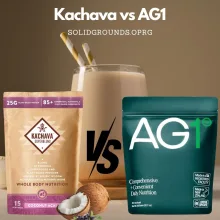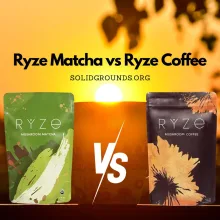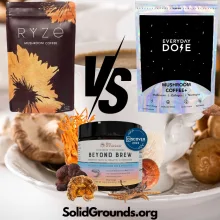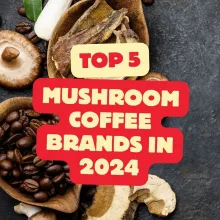Beyond Brew vs Mud Wtr | Solid Grounds
Beyond Brew and Mud Wtr are pioneering brands in the mushroom coffee alternative space, catering to health-conscious consumers seeking unique and sustainable beverage options. Beyond Brew offers a bold flavor profile with its blend of adaptogenic mushrooms and superfoods, appealing to those seeking potential cognitive-enhancing benefits.
Mud Wtr, on the other hand, provides a comforting chai-like taste with its minimalist approach to mushrooms and spices. While both brands prioritize ethical sourcing and sustainability, they differ in convenience and flavor preferences. Ultimately, the choice between the two comes down to personal priorities, whether it’s exploring new tastes, seeking potential health benefits, or valuing simplicity and familiarity in their daily beverage routine.
Beyond Brew vs Mud Wtr Comparison Table
 Beyond Brew vs Mud Wtr |  Beyond Brew |  MudWtr |
Flavor Profile | (Bold, complex, and slightly spiced) | (Comforting, chai-like, and more familiar) |
Health Benefits | (Potential cognitive-enhancing properties with adaptogenic mushrooms) | (Potential calming effects and gentle energy boost) |
Convenience | (Powder format for easy preparation) | (Requires more preparation, potential for clumping) |
Sustainability and Ethical Sourcing | (Emphasizes sustainable and ethical sourcing practices) | (Transparency in supply chain and minimal ingredients) |
Ingredients and Formulation | (Blend of adaptogenic mushrooms and superfoods) | (Simple blend of mushrooms and spices like cinnamon) |
Overall Rating | Overall Rating: 7.8/10 | Overall Rating: 7.4/10 |
Latest Price |  |  |
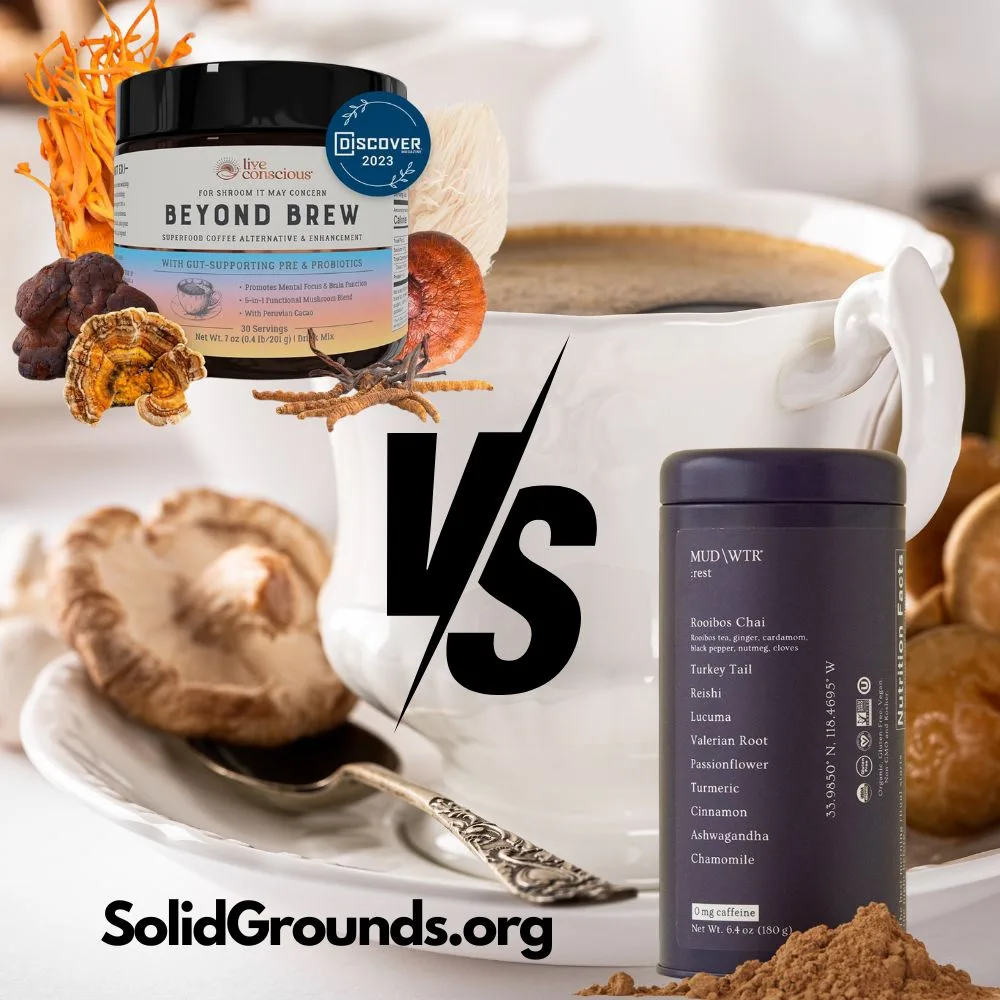
The Rise of Mushroom Coffee Alternatives
In the world of functional beverages, two names have carved a niche for themselves – Beyond Brew and Mud Wtr – with their unique take on mushroom-based coffee alternatives. As consumers become increasingly conscious of their health and wellness choices, these beverages have emerged as intriguing options for those seeking a boost without the jitters of traditional caffeine.
Beyond Brew: Adaptogenic Mushrooms Meet Superfoods
At the heart of Beyond Brew lies a carefully crafted blend of adaptogenic mushrooms, including lion’s mane and cordyceps. These mushrooms are known for their potential benefits in enhancing cognitive function, boosting energy levels, and supporting the immune system. However, Beyond Brew takes it a step further by incorporating a range of superfoods and spices into their formulation.
Unique Flavor Profile and Sustainable Sourcing
Among the ingredients in Beyond Brew, you’ll find cocoa and turmeric, which lend a rich, earthy flavor to the beverage while offering potential anti-inflammatory and antioxidant properties. The addition of coconut milk powder contributes to a creamy texture, making it a satisfying alternative to traditional coffee. Beyond Brew prides itself on sustainable sourcing practices, ensuring that their ingredients are ethically obtained and environmentally responsible. Their sleek packaging appeals to conscious consumers who value both taste and sustainability.
Mud Wtr: Simplicity with Mushrooms and Spices
Mud Wtr takes a more minimalist approach to their mushroom coffee alternative. Their primary blend consists of mushrooms like chaga, reishi, and cordyceps, which have long been revered in traditional medicine for their potential health benefits.
Comforting Chai-like Flavor and Transparency
Where Mud Wtr stands out is in its simplicity. By combining these mushrooms with spices like cinnamon and a touch of coconut milk, they create a rich, creamy beverage reminiscent of a chai latte. The result is a comforting and soothing drink that appeals to those who prefer a more traditional flavor profile. Transparency is a core value for Mud Wtr, as they strive to provide detailed information about their sourcing and minimal ingredient list. This approach resonates with consumers who prioritize clean labels and a commitment to simplicity.
Comparing Flavor, Convenience, and Sustainability
When it comes to flavor, Beyond Brew and Mud Wtr offer distinctly different experiences. Beyond Brew’s blend of superfoods and spices creates a more complex and slightly spiced taste, appealing to those who enjoy bold flavors. In contrast, Mud Wtr’s chai-like profile offers a more familiar and comforting taste, making it a smoother transition for those accustomed to traditional coffee or tea beverages.
Evaluating Convenience and Eco-friendly Practices
Convenience is another factor to consider. While both drinks are relatively easy to prepare, Beyond Brew’s powder format may offer a slight edge for those seeking a no-fuss option. Mud Wtr, on the other hand, requires a bit more preparation, as the drink is made by mixing the mushroom blend with hot water or milk. In terms of sustainability, both brands prioritize ethical and environmentally conscious practices. Beyond Brew emphasizes their sustainable sourcing, while Mud Wtr’s commitment to transparency extends to their supply chain. However, it’s worth noting that the packaging choices of each brand may vary, impacting their overall environmental footprint.
Scrutinizing Health Claims and Scientific Backing
Both Beyond Brew and Mud Wtr make bold claims about the potential health benefits of their mushroom-based beverages. From boosting energy and focus to supporting immune function, these claims are largely based on the purported properties of the mushrooms used in their formulations. However, it’s essential to note that while some studies have explored the potential benefits of certain mushrooms, the scientific evidence regarding their efficacy in functional beverages is still limited. Additionally, third-party testing and certifications can provide valuable insights into the quality and potency of the ingredients used.
Weighing Pros and Cons
As with any product, both Beyond Brew and Mud Wtr have their pros and cons. Beyond Brew’s strengths lie in its unique flavor profile and potential cognitive-enhancing properties, thanks to its adaptogenic mushroom blend. However, some consumers may find the taste too bold or the price point higher compared to traditional coffee options. Mud Wtr, on the other hand, excels in its simplicity and familiarity, making it an easier transition for those new to mushroom-based beverages. Its minimal ingredient list and commitment to transparency are also appealing factors. However, the preparation process may be less convenient for those seeking a quick on-the-go option.
Insights from Consumer Reviews and Feedback
To truly understand the appeal and efficacy of these mushroom coffee alternatives, it’s crucial to consider consumer reviews and feedback. While both brands boast loyal followings, the experiences and opinions of real users can provide invaluable insights.
Praise and Critiques for Beyond Brew
Beyond Brew has garnered praise for its unique flavor profile and perceived cognitive benefits, with many users reporting increased focus and energy without the jitters of traditional caffeine. However, some have critiqued the taste as being too strong or earthy for their preferences.
Comforting Taste and Preparation Challenges for Mud Wtr
Mud Wtr, on the other hand, has been commended for its comforting chai-like taste and perceived calming effects. Positive reviews often highlight the beverage’s ability to provide a gentle energy boost without the crash associated with caffeine. However, some users have expressed concerns about the preparation process and the potential for clumping or sediment.
Social Media Sentiment Analysis
Social media sentiment analysis can also provide a broader perspective on how these mushroom coffee alternatives are perceived by the general public. By monitoring hashtags, mentions, and online conversations, brands can gauge overall consumer sentiment and identify areas for improvement.
The Verdict: Tailoring to Personal Preferences
After a thorough analysis of Beyond Brew and Mud Wtr, it’s clear that both beverages offer unique value propositions for different consumer preferences.
Beyond Brew: Bold Flavors and Cognitive Benefits
For those seeking a bold, flavor-forward experience and potential cognitive-enhancing benefits, Beyond Brew emerges as a standout choice. Its blend of adaptogenic mushrooms and superfoods caters to health-conscious individuals who prioritize functional ingredients and are willing to explore new taste profiles.
Mud Wtr: Simplicity and Comfort
On the other hand, Mud Wtr’s appeal lies in its simplicity and familiarity. Its chai-like flavor and minimal ingredient list make it an attractive option for those seeking a comforting and soothing beverage with potential health benefits, without straying too far from traditional tastes.
Convenience and Sustainability Considerations
In terms of convenience, Beyond Brew’s powder format may have a slight edge, while Mud Wtr’s preparation process could be a deterrent for those with a busy on-the-go lifestyle. Sustainability and ethical sourcing are strengths shared by both brands, although their specific practices and packaging choices may vary, impacting their overall environmental footprint.
Tailoring to Personal Priorities
Ultimately, the choice between Beyond Brew and Mud Wtr comes down to personal preferences and priorities – whether it’s taste, health benefits, convenience, or brand values that resonate most strongly.
Suggestions for Improvement and Innovation
While both Beyond Brew and Mud Wtr have carved out a niche in the functional beverage market, there is always room for improvement and innovation.
Potential Enhancements for Beyond Brew
For Beyond Brew, exploring different flavor combinations or offering a milder version of their mushroom blend could appeal to a broader audience. Additionally, introducing more portable or on-the-go formats could enhance convenience for busy consumers.
Streamlining Mud Wtr’s Offerings
Mud Wtr, on the other hand, could consider streamlining their preparation process or offering pre-mixed options for added convenience. Expanding their flavor offerings beyond the traditional chai-like profile could also attract new consumers seeking variety.
Transparency and Third-Party Certifications
Both brands could benefit from continued transparency and third-party certifications to validate their health claims and ingredient quality. Collaborations with influencers or experts in the wellness space could further solidify their credibility and reach new audiences.
Concluding Thoughts on Mushroom Coffee Alternatives
In the ever-evolving landscape of functional beverages, Beyond Brew and Mud Wtr have carved out unique niches as pioneers in the mushroom coffee alternative space. While they share the common goal of providing healthier and more sustainable options, their distinct approaches cater to different consumer preferences.
Beyond Brew’s Bold and Complex Approach
Beyond Brew’s bold and complex flavor profile, coupled with its adaptogenic mushroom blend, appeals to those seeking potential cognitive-enhancing benefits and a departure from traditional tastes.
Mud Wtr’s Comforting Familiarity
Conversely, Mud Wtr’s simplicity and familiarity offer a comforting and approachable option for those seeking a gentle energy boost and potential health benefits without straying too far from traditional flavors.
Evaluating Strengths and Weaknesses
Both brands have their strengths and weaknesses, with factors such as taste preferences, convenience, sustainability, and health priorities influencing consumer choices. As the functional beverage market continues to evolve, it will be fascinating to see how these brands adapt and innovate to meet the changing needs of health-conscious consumers.
Personal Preference as the Deciding Factor
Ultimately, the choice between Beyond Brew and Mud Wtr comes down to personal preferences and priorities. Whether it’s the bold and unique flavor profile of Beyond Brew or the comforting simplicity of Mud Wtr, these mushroom coffee alternatives offer intriguing options for those seeking a healthier and more sustainable approach to their daily beverage routine.
An Exciting Future for Functional Beverages
As awareness of health and wellness continues to grow, the market for functional beverages is poised for further innovation and growth. Brands like Beyond Brew and Mud Wtr are paving the way for new and exciting options that cater to diverse consumer preferences while promoting overall well-being.
Embracing Healthy and Sustainable Choices
In a world where consumers are increasingly conscious of the impact of their choices on their health and the environment, the rise of mushroom coffee alternatives represents a shift towards more mindful and sustainable beverage options.
Continuous Evolution and Refinement
As these pioneering brands continue to refine their offerings, it will be interesting to see how they address consumer feedback, incorporate new research findings, and explore innovative formulations and flavors.
A Promising Path Forward
With their unique approaches and commitment to providing healthier alternatives, Beyond Brew and Mud Wtr have paved the way for an exciting future in the functional beverage space. As consumers continue to seek out products that align with their wellness goals and values, these mushroom coffee alternatives represent a promising path forward, offering a delicious and potentially beneficial way to start the day or provide a rejuvenating pick-me-up.
 |  |
FAQs and Answers
What are the caffeine levels in Beyond Brew and Mud Wtr compared to regular coffee?
Both Beyond Brew and Mud Wtr contain far less caffeine than a typical cup of coffee.
Beyond Brew is marketed as being caffeine-free, as it does not contain any coffee beans or added caffeine sources. However, some of the mushroom ingredients like lion’s mane and cordyceps may contain very small amounts of naturally occurring compounds similar to caffeine.
Mud Wtr also does not use coffee beans, but it does contain a small amount of caffeine from the black tea and cacao ingredients in its blend. On their website, Mud Wtr states that one serving contains 1/7th the caffeine of a typical cup of coffee, or around 30-35mg of caffeine.
In comparison, an 8oz cup of brewed coffee generally contains around 95mg of caffeine. So both mushroom coffee alternatives provide just a mild caffeine boost compared to regular coffee’s more substantial jolt.
The low caffeine levels allow people to potentially experience increased focus and calm energy from the adaptogenic mushrooms without the jitters, crashes or disrupted sleep that can come from high caffeine intake.
Are there any potential side effects or interactions to be aware of with the mushroom ingredients?
Yes, there are some potential side effects and interactions to be aware of with the mushroom ingredients used in drinks like Beyond Brew and Mud Wtr:
Possible Side Effects:
Digestive issues like gas, bloating, or upset stomach in some people, especially when first introducing mushroom supplements.
Allergic reactions in those with mushroom or mold allergies.
Interference with blood clotting for some mushroom varieties like reishi.
Lower blood sugar levels in diabetics when consuming certain mushrooms.
Potential Interactions:
Mushrooms may interact with medications that are metabolized by the liver’s cytochrome P450 enzyme system, such as antidepressants, antipsychotics, anti-anxiety drugs, and more.
Lion’s mane may potentially increase or decrease the effects of diabetes medications.
Reishi mushroom may interact with blood thinners, immunosuppressants, and anti-platelet drugs.
Chaga mushroom may interact with diabetic medications, blood thinners, and certain chemotherapy drugs.
It’s advisable to speak to your doctor or pharmacist before adding mushroom coffee drinks to your routine, especially if you have any underlying health conditions or take medications regularly. Starting with smaller servings can also help assess your body’s reaction. Third-party testing can verify mushroom quality and potency.
What are the manufacturing standards and certifications each brand adheres to?
Based on typical industry practices, here are some manufacturing standards and certifications they may follow:
Good Manufacturing Practices (GMPs)
Most legitimate supplement brands follow current good manufacturing practice (cGMP) regulations set by the FDA to ensure proper quality control and safe manufacturing conditions.
Third-Party Testing
Many top brands get their products third-party tested by independent labs to verify ingredient potency, identify potential contaminants like heavy metals, and confirm products meet label claims.
Certifications
Common certifications functional beverage brands may have include:
USDA Organic certification for use of organic ingredients
Non-GMO Project Verified for absence of genetically modified organisms
Vegan certification for absence of animal-derived ingredients
Gluten-free certification
Kosher and Halal certifications
Fair Trade certification for ethically sourced ingredients
Without explicit information from Beyond Brew and Mud Wtr, it’s difficult to confirm which exact standards and certifications they follow for their mushroom coffee products. Ideally, reputable brands would prominently display any certifications they have to build consumer trust in their quality and transparency.
How do the prices of Beyond Brew and Mud Wtr compare to each other and to regular coffee for the same volume?
Based on research of their current prices:
Beyond Brew Pricing:
A bag of 14 servings (10.5oz) costs $29.99
This works out to approximately $2.14 per serving
Mud Wtr Pricing:
A tin of 30 servings (7.5oz) costs $40
This comes out to $1.33 per serving
In comparison to regular brewed coffee:
A 12oz bag of ground coffee containing about 30 servings can cost anywhere from $5-$15 typically
So the per serving cost is around $0.17-$0.50 for regular coffee
This puts Beyond Brew at the high end, being over 4 times more expensive per serving than regular coffee on average. Mud Wtr is more moderately priced at 2-3 times the cost of a cup of regular coffee.
A few factors contribute to the premium pricing:
Use of specialty mushroom ingredients and adaptogens
Sustainable/ethical sourcing practices
Cost of production and third-party testing
Branding and marketing as functional premium beverages
So while much pricer than basic coffee, the mushroom coffee alternatives provide differentiated functional benefits to justify the higher cost for their target health-conscious consumers. But the prices can still be prohibitive for frequent, daily usage.
Are there any vegan, keto, or allergen-free options available for either brand?
Vegan Options:
Both brands appear to be vegan-friendly and do not use any animal-derived ingredients in their primary products.
Beyond Brew lists ingredients like mushrooms, cocoa, turmeric, coconut milk powder which are all plant-based.
Mud Wtr’s blend contains mushrooms, spices like cinnamon, and coconut milk powder, with no obvious non-vegan items.
Keto Options:
While not outright stated, their simple ingredient lists suggest both could potentially be keto-friendly in moderation as part of a ketogenic diet.
Beyond Brew and Mud Wtr are free of grains, sugars, and use low amounts of higher carb ingredients like cocoa and coconut milk powder.
Allergen-Free Options:
Neither brand makes explicit allergen-free claims, but their core ingredients don’t include major allergens.
Beyond Brew and Mud Wtr are coconut-based rather than using nuts or nut milks.
They appear free of grains/gluten, soy, and don’t list any other potential allergens.
However, both are manufactured in facilities that may handle allergens, so cross-contamination is possible.
Overall, their simple, plant-based formulas make both Beyond Brew and Mud Wtr more easily compatible with vegan or keto diets compared to regular coffee drinks. But those with food allergies may still want to exercise caution without official allergen-free certifications.

